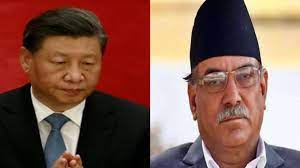Meeting Prachanda, Xi Jinping declares that China would improve border infrastructure to end Nepal’s status as a landlocked country
During his meeting with Nepalese Prime Minister Pushpa Kamal Dahal ‘Prachanda’ on Saturday, Chinese President Xi Jinping made a commitment to assist Nepal in its transition from a landlocked country to a land-linked nation. This commitment included the facilitation of infrastructural connections and cooperation with transit transportation.
During the Hangzhou Asian Games, which were held in eastern China, Xi had the opportunity to meet Prachanda.
After making his debut in India and the United States, Nepalese Prime Minister Prachanda traveled to China for the first time. Prior to this, he had been to the United States and India. Prachanda has publicly distanced himself from the pro-China Communist Party of Nepal (Unified Marxist-Leninist), which is led by KP Oli.
During his meeting with Prachanda, President Xi Jinping, who paid a high-profile visit to Nepal in 2019 and announced several high-profile projects, stated that the two countries that share borders through Tibet made progress with the “Trans-Himalayan Multi-Dimensional Connectivity Network” and other “Belt and Road” projects that have “taken shape.”
According to a report that was put out by the state-run news agency Xinhua, he was cited as stating that he supported efforts from both sides to enhance infrastructure connection and increase transit transportation cooperation in order to assist Nepal in its transition from a landlocked nation to a land-linked country as soon as possible.
The initiatives aimed at establishing trans-Himalayan connection include the construction of roads and train lines that will pass over the treacherous alpine terrain separating Nepal and Tibet.
Due to the fact that it is landlocked, the majority of its imports come from India. As part of its attempts to increase its own influence, China intends to become involved in the process of reducing Nepal’s dependency on India.
However, detractors assert that the majority of Chinese initiatives in Nepal have stalled, and this includes the construction of border infrastructure. This is due to Beijing’s decision to seal its borders during the COVID-19 epidemic.
According to Pragya Ghimire of the Institute of Foreign Affairs in Nepal, “Nepal signed a transport-transit agreement to access seven ports in China; nine BRI projects were selected; and the “Trans-Himalayan Multi-Dimensional Connectivity Network” umbrella concept was presented, enhancing cross-border cooperation.” All of these developments took place during the BRI summit.
She wrote in an article that was published in the Nepalese newspaper, the Kathmandu Post, before of Dahal’s eight-day tour during which he is expected to visit Tibet, that when Chinese President Xi Jinping visited Nepal in 2019, the two countries inked seven bilateral agreements, but the majority of them were not executed.
During the meeting that Xi had with Prachanda, he made the following statement: “The two sides should always understand and support each other on issues concerning each other’s core interests and major concerns, and constantly consolidate the political foundation of bilateral relations.”
According to Xinhua’s report, Prachanda added that Xi is a visionary global leader and a close friend of all Nepalese people.
Prachanda reaffirmed Nepal’s staunch devotion to the one-China policy, saying that he did so while hailing Nepal and China as friends and partners who are able to understand, depend on, and support one another.
As part of the one-China policy, Nepal places restrictions on the ability of Tibetans to go to India and meet with the Dalai Lama through the land borders.
Dahal informed Xi that both Taiwan and Tibet are inalienable portions of China’s territory, and that Nepal would not let any force to exploit its territory to undermine China’s sovereignty and security. He said that Nepal’s attitude on this matter is clear and unshakeable.
He said that Nepal has a profound admiration for the Belt and Road Initiative, would take an active role in Belt and Road cooperation, and will also seek to encourage the building of the Trans-Himalayan Multi-Dimensional Connectivity Network.
According to reports in Nepalese media, both nations were planning to sign a number of agreements in order to increase the amount of money invested by the Chinese in Nepal.
“The two leaders agreed on forging collaboration among all the regional forces on issues relating to regional stability, peace, and progress,” Govinda Acharya, the press adviser of Nepal Prime Minister Prachanda, stated in the meanwhile. According to Acharya, the two leaders came to an agreement to strengthen their mutual collaboration by better understanding each other’s issues and sensitivities.
“Xi said that he was ready to collaborate and cooperate with an open heart in matters relating to Nepal’s economic and social development.” During the meeting, Xi said that Nepal and China have “taken forward very close relations without any discrimination regarding small and big countries, recognizing mutual respect, support, and coexistence by pursuing five principles of peaceful coexistence.” Xi was referring to the fact that Nepal and China have “taken forward very close relations without any discrimination regarding small and big countries.”
“He also expressed confidence that the relations between the two countries will be taken to a new height in the days ahead,” the official newspaper Gorkhapatra said, citing press adviser Acharya. “He also expressed confidence that the relations between the two countries will be taken to a new height.”
The Prime Minister of Nepal, Mr. Prachanda, spoke on the long-standing historical links that exist between Nepal and China, and he said that the new ideas that President Xi has proposed would prove to be vital for the maintenance of peace and the development of this area.
After delivering a speech at the 78th session of the United Nations General Assembly in New York, Prachanda has now arrived in China by nonstop flight.
During his official trip to China, the Prime Minister is traveling with a number of other top officials, including the Minister of Foreign Affairs, NP Saud. Following his meeting with President Xi, Prachanda is scheduled to travel to Beijing, where he will engage in bilateral discussions with his Chinese counterpart Li Qiang on September 25.







